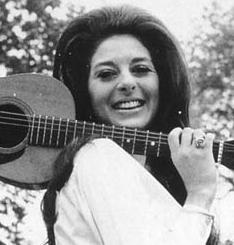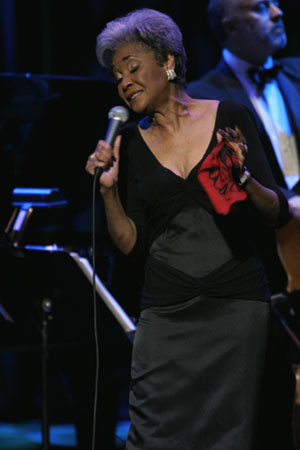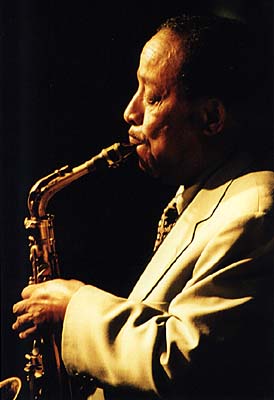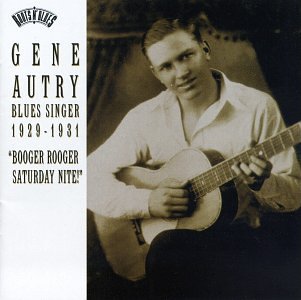NANCY WILSON / “Ode To Billie Joe”
The other day, Asante and I were driving on the 163 when Nancy Wilson’s version of “Ode To Billie Joe” came on. Without really thinking about it before I said it, I told Asante, “I do believe this woman has the best voice of any singer I’ve ever heard.” I don’t remember if Asante agreed with me then or not, but, after thinking about it for the last couple of days, I agree with me. There’s no one—no one I’ve ever heard, at least—who has a singing voice as clean, pitch-perfect, and just plain good as Nancy’s is.
 The song in question, “Ode To Billie Joe,” dates back to 1967, when a young country singer calling herself Bobbie Gentry (real name, Roberta Streeter; born in rural Mississippi to Portuguese parents) wrote and recorded it as the b-side of her first single. Bobbie’s song is a great example of two of the strengths of country music. (I can hear all of you now: “Country music has strengths?” Yes, people. It does.) One, it is centered around the lives and loves of ordinary, working-class people and two, it tells a coherent story—though it runs barely over four minutes, Bobbie’s song has a setup, a conflict and a resolution (though an ambiguous one), all of it giving the tune the narrative sweep of a full-length movie. (And in fact, “Ode To Billie Joe” was so popular that they actually did make a movie based on the song.)
The song is centered around a mystery. Two mysteries, actually. The first is: Why did Billie Joe kill himself? The second is: What did Billie Joe and the narrator throw off of the side of the bridge? Listening to the song, one gets the feeling that answering the second question would answer the first as well. Most speculate—and I have to agree—that the ‘something’ the young lovers threw into the river was their newborn baby, but given that Bobbie Gentry herself has told interviewers that she doesn’t know why her characters did what they did, we can only speculate.
I like the original a lot. Bobbie Gentry has a husky and expressive voice that suits the material well. In 1967, Bobbie was all of twenty-three years old, but there’s a weary sarcasm in her tone that tells us she’s already either seen or heard her share of ‘no good’ stories in her native Chickasaw County, Mississippi.
The song in question, “Ode To Billie Joe,” dates back to 1967, when a young country singer calling herself Bobbie Gentry (real name, Roberta Streeter; born in rural Mississippi to Portuguese parents) wrote and recorded it as the b-side of her first single. Bobbie’s song is a great example of two of the strengths of country music. (I can hear all of you now: “Country music has strengths?” Yes, people. It does.) One, it is centered around the lives and loves of ordinary, working-class people and two, it tells a coherent story—though it runs barely over four minutes, Bobbie’s song has a setup, a conflict and a resolution (though an ambiguous one), all of it giving the tune the narrative sweep of a full-length movie. (And in fact, “Ode To Billie Joe” was so popular that they actually did make a movie based on the song.)
The song is centered around a mystery. Two mysteries, actually. The first is: Why did Billie Joe kill himself? The second is: What did Billie Joe and the narrator throw off of the side of the bridge? Listening to the song, one gets the feeling that answering the second question would answer the first as well. Most speculate—and I have to agree—that the ‘something’ the young lovers threw into the river was their newborn baby, but given that Bobbie Gentry herself has told interviewers that she doesn’t know why her characters did what they did, we can only speculate.
I like the original a lot. Bobbie Gentry has a husky and expressive voice that suits the material well. In 1967, Bobbie was all of twenty-three years old, but there’s a weary sarcasm in her tone that tells us she’s already either seen or heard her share of ‘no good’ stories in her native Chickasaw County, Mississippi.
 Nancy Wilson’s version adds some fire to Bobbie’s weariness…call it indignation. I like to imagine that, in Nancy’s version, the girl in love with Billie Joe is black and Billie Joe jumped not just because of what they did to their baby, but because he knew they could never be together. (And maybe that’s the reason they killed their baby in the first place.)
Nancy Wilson’s version adds some fire to Bobbie’s weariness…call it indignation. I like to imagine that, in Nancy’s version, the girl in love with Billie Joe is black and Billie Joe jumped not just because of what they did to their baby, but because he knew they could never be together. (And maybe that’s the reason they killed their baby in the first place.)
 The last version up is an instrumental by Lou Donaldson*, whose bluesy verses ably capture the angry silence of the narrator as she’s forced to sit through breakfast while her family either pretends not to know or actually doesn’t know that the jumper they’re so flippantly discussing (“Well, Billie Joe never had a lick of sense/ Pass the biscuits, please”) was her boyfriend.
—Mtume ya Salaam
* Hip-hop fans may recognize Idris Muhammad’s opening drum break. It’s the basis for numerous rap songs—“Clap Your Hands” by A Tribe Called Quest comes to mind.
Tracks:
Nancy Wilson - “Ode To Billy Joe” – From Welcome To My Love
The last version up is an instrumental by Lou Donaldson*, whose bluesy verses ably capture the angry silence of the narrator as she’s forced to sit through breakfast while her family either pretends not to know or actually doesn’t know that the jumper they’re so flippantly discussing (“Well, Billie Joe never had a lick of sense/ Pass the biscuits, please”) was her boyfriend.
—Mtume ya Salaam
* Hip-hop fans may recognize Idris Muhammad’s opening drum break. It’s the basis for numerous rap songs—“Clap Your Hands” by A Tribe Called Quest comes to mind.
Tracks:
Nancy Wilson - “Ode To Billy Joe” – From Welcome To My Love (Capitol, 1968)
Bobbie Gentry – “Ode To Billie Joe” – From Greatest Hits
(Curb, 1990)
Lou Donaldson - “Ode To Billie Joe” – From Mr. Shing-A-Ling
(Blue Note, 1967)
And there you have it
I was multi-tasking (as usual) when I noticed that Mtume’s cover selection for this week had arrived. I saw “Ode To Billy Joe” and said to myself: I got one for Mtume on that tip. Unfortunately, I just couldn’t remember who did the version I was trying to recall. I went to iTunes and there it was: Nancy Wilson, plus King Curtis. So, I download them both, getting ready to write about how Nancy can tell a story with a sensitivity generally unmatched. It is not just that Nancy Wilson can sing, she can take a lyric and sing it in such a way that you believe every word. Nancy’s from Ohio, which is a long ways from Mississippi. But still, you believe this story that Nancy is singing even though you know it’s not true, simply because, if for no other reason, this is a cover of a popular hit.
So, here I am all amped up and ready to throw down, and then I download all of Mtume’s attachments. Lo and behold, he’s got the Nancy Wilson version.
So much for that.
Then I see Lou Donaldson and say, well I can drop the King Curtis on him. Plus, King Curtis is playing an electrified sax a la Eddie Harris. It’s from King Curtis Live At The Filmore and even though it’s far from the best of King Curtis on record, it’s still a funky, little version. Then I read what Mtume wrote, and in typical hip-hop fashion, Mtume doesn’t even bother to comment on Lou Donaldson. Instead, Mtume points to the phunky paradiddles of New Orleans drummer Idris Muhammad, noting how Idris’ percussion licks have been sampled by hip-hop.
So once again, Sir Sherlock Holmes (AKA, Mtume ya Salaam) is dropping science and his Baba is left sitting on the sidelines twidling his thumbs. Y'all know I’m good to go, but when the boy is shooting out the lights, I might as well just sit my ass on the bench and enjoy the show.
—Kalamu ya Salaam
 P.S. I guess about the only thing I might want to add to the discussion is a realization of how much of Country & Western music is directly influenced by Black music. How deep is it? Well, let me put it this way, early in his career, Gene Autry, who made a big name for himself as the “Singing Cowboy,” started out literally singing the blues. Check out the album cover above and Gene Autry’s version of “Frankie and Johnny”—as the African proverb states: know the beginning well, and the end will not trouble you. Yippy-yo, yippy-ye!
P.S. I guess about the only thing I might want to add to the discussion is a realization of how much of Country & Western music is directly influenced by Black music. How deep is it? Well, let me put it this way, early in his career, Gene Autry, who made a big name for himself as the “Singing Cowboy,” started out literally singing the blues. Check out the album cover above and Gene Autry’s version of “Frankie and Johnny”—as the African proverb states: know the beginning well, and the end will not trouble you. Yippy-yo, yippy-ye!
This entry was posted on Sunday, February 12th, 2006 at 6:09 am and is filed under Cover. You can follow any responses to this entry through the RSS 2.0 feed. You can leave a response, or trackback from your own site.
6 Responses to “NANCY WILSON / “Ode To Billie Joe””
February 13th, 2006 at 8:02 pm
Love this cover. Grew up as a fan of the original, and with Diallo & Devaughn makes this my favourite BoL yet. I’m surprised at the old country/soul comments though. Bobby Womack’s album & James Brown’s cover of "Your Cheatin’ Heart" are the obvious sixties references, but even Ray Charles’ pop crossover has a certain soulfulness to it. Still, keep it up I’m a big fan. Oh, I can’t seem to upload the whole track, might be my dialup.
kalamu says
thanks for letting us know about the ending on the nancy wilson track. it is now fixed!
February 15th, 2006 at 11:35 am
Nice article. Gene Autry’s album cover almost makes him look like a light-skinned brother, LOL!
February 15th, 2006 at 8:06 pm
I agree that Nancy has one of the purest voices ever. However, you have to listen to clarity and pristine quality of Ronnie Dyson, another highly underated and under exposed vocalist of another time and era.
February 18th, 2006 at 3:48 pm
Totally agree with your comments about country music. When I first arrived in this country, I was dropped in the middle of Oklahoma and the only music I could listen to on the radio was country. The vocals were strong, I could make out the words, but more importantly, they told stories. Within two years I was out of there, up in Boston, and I survived my first winter listening to “If we make it through December” and “Joeleen.” Yes, I had to suffer through the reactionary crap, but country still held me. Then when I moved to Detroit, I started off with country and bluegrass (thanks to the Arkansas Traveler show), but quickly discovered the blues (live and on radio). The blues held me, but when I’m on the highway where there’s more country than anything else, I still return to it. Wasn’t Charlie Pride also from the Mississippi Delta?
January 13th, 2008 at 2:35 pm
Hi
I was wondering do you who played that wild ! saxaphone on the Ode to Billy Joe ballad ?
November 28th, 2008 at 7:05 am
What a cool post! Any way to get those recordings?
kalamu sez:
direct links for the music are at the end of the article. click on the album titles highlighted in red.
Leave a Reply
| top |